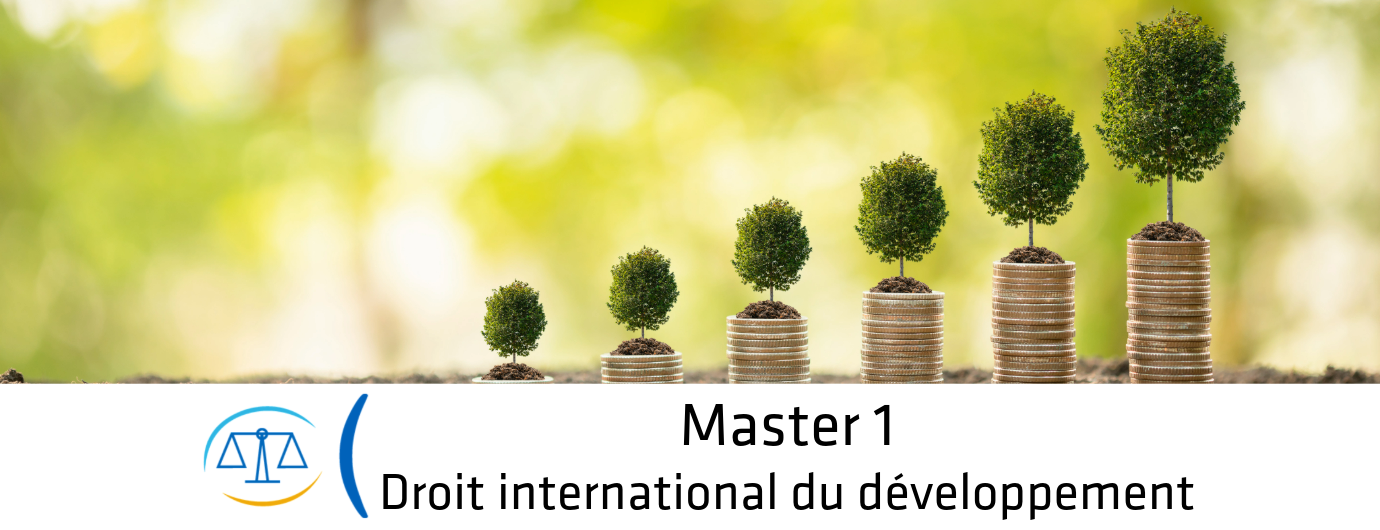
- Enseignant: Estelle BROSSET
- Enseignant: Anne-marie DE MATOS
- Enseignant: Eloise GENNET
- Enseignant: Alexandre KIEFFER
- Enseignant: Claire MONGOUACHON
- Enseignant: Vincent REVEILLERE
- Enseignant: Nathalie RUBIO

PRESENTATION GENERALE
Le cours de droit international du développement est un cours atypique par son objet : il n’est plus guère enseigné dans les facultés de droit en France : le point de vue communément partagé est que les règles nommées traditionnellement « droit international du développement » ayant échoué, ont été abandonnées.
Si cette discipline, entendue au sens d’un droit destiné à promouvoir un « Nouvel ordre international économique » (NOEI), relève effectivement largement de l’histoire, les questions d’inégalité de développement à l’échelle internationale (entre Etats, peuples, personnes) demeurent.
Le propos du cours est alors de démontrer que les règles internationales dédiées au développement n’ont pas disparues ; elles ont évolué et changé d’ambition. Le droit international du développement est mort, vive le droit international du développement ! : tel pourrait être le résumé du cours.
Une première partie revient sur les aspects historiques : un droit stato-centré et économico-centré au service de la réalisation d’un NOEI, trouvant à s’incarner dans des régimes dérogatoires (commerce, aide, investissement, ressources minérales des grands fonds marins). La seconde partie met l’accent sur les évolutions contemporaines : un droit holistique, englobant, prenant en compte le développement humain (au-delà du développement de l’Etat), le développement durable (au-delà du développement économique).
Le cours de droit international du développement est un cours atypique par son objet : il n’est plus guère enseigné dans les facultés de droit en France : le point de vue communément partagé est que les règles nommées traditionnellement « droit international du développement » ayant échoué, ont été abandonnées.
Si cette discipline, entendue au sens d’un droit destiné à promouvoir un « Nouvel ordre international économique » (NOEI), relève effectivement largement de l’histoire, les questions d’inégalité de développement à l’échelle internationale (entre Etats, peuples, personnes) demeurent.
Le propos du cours est alors de démontrer que les règles internationales dédiées au développement n’ont pas disparues ; elles ont évolué et changé d’ambition. Le droit international du développement est mort, vive le droit international du développement ! : tel pourrait être le résumé du cours.
Une première partie revient sur les aspects historiques : un droit stato-centré et économico-centré au service de la réalisation d’un NOEI, trouvant à s’incarner dans des régimes dérogatoires (commerce, aide, investissement, ressources minérales des grands fonds marins). La seconde partie met l’accent sur les évolutions contemporaines : un droit holistique, englobant, prenant en compte le développement humain (au-delà du développement de l’Etat), le développement durable (au-delà du développement économique).
- Enseignant: Alexandre KIEFFER
- Enseignant: Marie pierre LANFRANCHI
